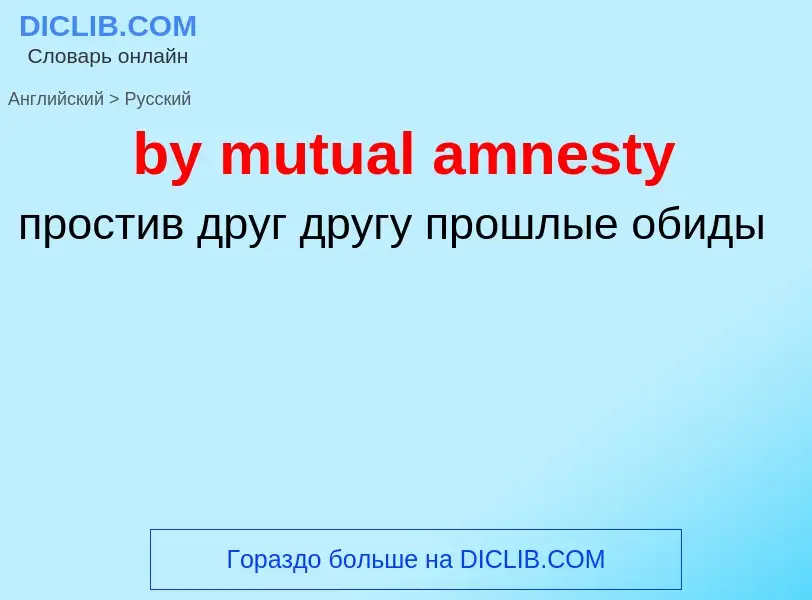by mutual amnesty - translation to ρωσικά
юриспруденция
компания на взаимных началах (компания, созданная с целью организации производства и предоставления всем участникам этого объединения (инвесторам компании) какой-либо услуги на более выгодных условиях, чем они могли бы получить без создания компании (при покупке этой услуги на рынке); вклады инвесторов такой компании представляют собой акции или паи с правом голоса; доходы могут распределяться в пропорции от трудового и иного вклада участника)
синоним
Смотрите также
['æmnəsti]
существительное
['æmnəsti]
общая лексика
амнистия
(все)прощение
желание
стремление забыть или простить (что-л.)
сознательное попустительство
глагол
общая лексика
амнистировать
давать амнистию
Ορισμός
Βικιπαίδεια
Tax amnesty allows taxpayers to voluntarily disclose and pay tax owing in exchange for avoiding tax evasion penalties. It is a limited-time opportunity for a specified group of taxpayers to pay a defined amount, in exchange for forgiveness of a tax liability (including interest, penalties, and criminal prosecution) relating to previous tax periods. It typically expires when some authority begins a tax investigation of the past-due tax.
In some cases, legislation extending amnesty also imposes harsher penalties on those who are eligible for amnesty but do not take it. Tax amnesty is one of voluntary compliance strategies to increase tax base and tax revenue. Tax amnesty is different from other voluntary compliance strategies in part where tax amnesty usually waives the taxpayers' tax liability. In 2016, Indonesia had run one of the biggest Tax Amnesty scheme in the world and managed to gather around US$9.61 billion as taxes in 9 months.
Introduction of amnesty in any fiscal year is to help a state treasury raise tax revenues, adding beneficiaries who have not declared their assets previously. The main purpose is to replicate the economy and encourage individuals and corporations to declare their wealth as it may arise. Under this scheme, the beneficiary just has to pay the tax on the total assets which are declared. States introduce this scheme when they believe that individuals are hiding their wealth from the tax authorities.
Tax revenues raised through these schemes are used for the well being of the state. Every individual and company has to report annually on their business activities in their tax return. Those who remain transparent in declaring their assets and liabilities to the tax authorities do not get inquiries or investigations. Tax amnesty is beneficial for those who have been hiding or not declaring their assets fair and transparently for years, who can make their assets legitimate by declaring them whether they exist within or outside the country. When such schemes are introduced, state revenue and tax departments give time to declare their wealth without any penalty. After it elapses, there will be a penalty in addition to the original tax rate.
